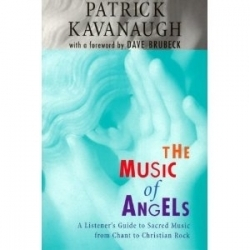The Music of Angels
A Listener's Guide to Sacred Music from Chant to Christian Rock
What do David Brubeck and Saint Francis of Assisi have in common? According to this highly informative and readable book they are both members of a music ministry which stretches back for 2000 years. Kavanaugh illuminates the long and branching history of Western Christian music in a very even-handed approach that includes ancient chants, mid-1800s hymn writing and Christian rock music. Along the way he makes a strong case for the commonalties of all forms of Christian music and communicates his belief that all forms of Christian music deserve their place in the believer’s heart and in the worship experience.
The book explores music in the church in chronological order. Kavanaugh uses the analogy of a stream to explore the development of music in the Christian experience from sacred worship to “secular” forms of sacred music such as gospel and Christian rock that emerge in the twentieth-century. Many of the important historic figures are given brief biographical sidebars complete with photos and quotes. Kavanaugh is very thorough in his approach, which provides a number of surprises, particularly in his inclusion of classical composers such as Charles Ives and Igor Stravinsky. It is worth hearing Stravinsky’s voice, “The church knew what the Psalmists knew: music praises God. Music is as well or better able to praise Him than the building of the church and all its decorations; it is the church’s greatest ornament.”
The Music of Angels provides an alternative history of Western music with a focus on music for worship. Fascinatingly, it begins as any academic music history text would begin, with the early chants used in the Christian church. Along the way it crosses over from the classical to the popular world following the developments of the Christian music industry into the present day. While this book is of interest to anyone involved in Christian sacred music, its most likely audience will be church music directors and musicians who want to expand their knowledge of the history and traditions of music in the sacred service.
Reviewed by
Peter Terry
Disclosure: This article is not an endorsement, but a review. The publisher of this book provided free copies of the book to have their book reviewed by a professional reviewer. No fee was paid by the publisher for this review. Foreword Reviews only recommends books that we love. Foreword Magazine, Inc. is disclosing this in accordance with the Federal Trade Commission’s 16 CFR, Part 255.

